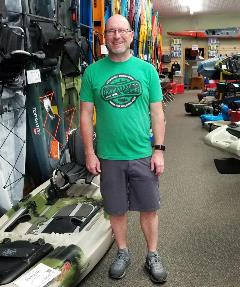Tim Wagner, IWLA Agriculture Outreach Coordinator
Outdoor America 2019 Issue 3
Spend five minutes with Darren Siefken and you get a sense that he’s doing exactly what he loves: helping people enjoy, appreciate, and protect the outdoors.
Siefken is founder and owner of Crawdaddy Outdoors, one of Iowa’s largest retail dealers of kayaks and canoes. Customers can choose from a diverse inventory of approximately 200 boats and a full range of accessories, backpacking gear, cross-country skis, and high-quality outdoor clothing.
Siefken’s career in Iowa’s outdoors came naturally. He grew up in the Mississippi River town of Burlington, Iowa, also the birthplace of one of America’s best-known conservationists, Aldo Leopold. His experiences on the “Great River” led to a degree in fisheries biology from Iowa State University with a minor in leisure studies. In 2005, after working as Bremer County’s naturalist for 11 years and as outdoor education director for the local extension office, Siefken started Crawdaddy.
With a background in environmental education, Siefken recognizes the need to educate customers. “You can’t just sell them stuff. It’s about getting them out there and feeling comfortable in the outdoors.”
I take pleasure when I no longer see the same people on our river trips. That’s because I know they’re out doing it themselves.-Darren Siefken
His typical work day finds him advising a customer on a kayak purchase, helping install a car rack system to carry outdoor gear, or leading first-time customers on a float of one of Iowa’s many rivers.
Although trips are a much smaller portion of his business than the retail sector, Siefken enjoys putting together a range of outings for novices and experts. These include evening floats at a local marsh to observe waterfowl; one- or two-day floats on Iowa rivers; fully outfitted, multi-day kayaking trips in Minnesota; and even backpacking trips to the Black Hills.
“I take pleasure when I no longer see the same people on our river trips,” Siefken says. “That’s because I know they’re out doing it themselves.”
He recognizes the long-term value in helping customers appreciate and protect their favorite places. Because the biggest share of his business depends on water-related activities, he hasn’t shied away from helping address Iowa’s water quality issues.
In 2010, he distributed fliers and made phone calls to support a successful ballot measure that authorized a small sales tax increase for the Iowa Natural Resources and Outdoor Recreation Trust Fund. The Fund, expected to raise an estimated $185 million annually for a variety of conservation, water quality, and outdoor recreation projects, remains at a zero balance, however, because the Iowa legislature has refused to allow the tax increase to take effect.
Siefken supported the Fund, hoping it would address the state’s many water quality issues and increase the amount of Iowa’s public spaces. Nearly 10 years later, he laments the legislature’s failure and the impression it leaves for out-of-state visitors and what it means for the state’s outdoor recreation economy.

“When you go to parks and trails in other states, you say ‘Wow! They are really spending some serious money to attract people,’” Siefken says. “But then you go to our local wildlife area and you get the impression that we’re really not welcoming people.”
Impaired water quality remains the 800 lb. gorilla for Iowa. Data from the University of Iowa’s Laboratory of Hydroscience and Engineering show that the state’s nutrient contribution to the dead zone in the Gulf of Mexico continues to increase, and levels of E. coli and other bacteria are increasing in Iowa’s rivers.
“We definitely hear about water quality from our customers, asking if it’s safe,” Siefken says. “Kayaking is the biggest part of our business right now. If the DNR or EPA is saying that our waters are not safe to paddle, I could definitely see where that could affect our sales.”
His frustration over what appears to be little progress in the state is obvious.
“Will it take an event like Flint, Michigan, where drinking water and health issues come to light in a more serious way?” he asks. “Must we shut off access to a lake because of blue-green algae? Or warnings that you can’t bring your dog out here or you can’t go swimming or fishing in your favorite water?”
He mobilized his customers earlier this year when the Iowa legislature introduced a bill that would have made it nearly impossible for the state to acquire private lands for the public domain. The measure proved to be surprisingly controversial considering that Iowa is 49th in the nation for the amount of public lands in the state.
News of the bill broke on a Friday afternoon. The next day, Siefken put up an alert on his store’s Facebook page urging followers to contact their legislators about the issue. A scheduled public hearing the following Monday drew roughly 400 people in unanimous protest, resulting in the bill dying before it even went to committee. Siefken’s post reached 33,000 people, which took him by surprise.
“I often think twice about posting something environmental because we don’t want to ruffle feathers,” Siefken says. “But this one proved that we can do it more frequently, because there was not a single negative comment on the 33,000 views of my post.”
The future of Crawdaddy Outdoors looks similar to today, although Siefken is open to adjusting his business model to help people get beyond any perceived obstacles to outdoor activities. “I look at our place as a way to break down those barriers,” he says. “I hope to just keep getting people outdoors.”